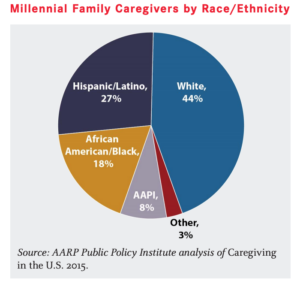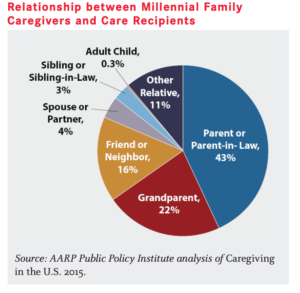“There are four types of people in the world, those who have been caregivers, those who are currently caregivers, those who will be caregivers, and those who will need a caregiver.” –Rosalynn Carter
When young people think of caregivers, they may envision hired help for an elderly grandparent. But the definition of caregiver goes way beyond those who assist the very elderly, and one in four of the 40 million caregivers is of the Millennial generation. They are also the most diverse group of caregivers in terms of race, ethnicity, gender and sexual orientation according to an article by AARP.

But what is a caregiver? A caregiver may be someone who cares for siblings or cousins due to an absent parent, or they may support a child with developmental or intellectual disabilities who needs extra care. It could be someone who supports a parent with emotional disturbances, a neighbor who needs assistance with their daily tasks, or a veteran spouse who returns home with PTSD. In fact, one in three of Millennial family caregivers is caring for someone with serious emotional or mental health problems, an intellectual disorder, or a behavioral issue. (Flinn, B., 2018)
As a college student having caregiving duties can add extra stress, sometimes requiring up to 20 hours of care per week or more in addition to school and paid work. And caregivers also struggle to perform in the workplace with 60% reporting they have had to cut work hours, take a leave of absence, or have received performance warnings.

Thankfully, recognizing the need for additional support, more states have been passing laws to support family caregivers, providing additional leave and employment flexibility while caring for their loved ones. The Idaho Caregiver Alliance, in partnership with the Center for the Study of Aging at Boise State University, provides extensive resources for caregiving Idahoans.
Is there someone in your life who is vulnerable to COVID-19? The Idaho Caregiver Alliance has also compiled a helpful list of caregiver resources during COVID-19.
If you’re interested in the work of Idaho Caregiver Alliance, check out the recent expert panel (below) on patient safety, following a screening of the documentary To Err is Human. The panel discusses self-advocacy and caregiver-advocacy in the healthcare system, which can be wrought with miscommunication and preventable medical errors.
